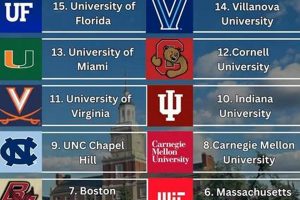Top-tier undergraduate history programs offer rigorous coursework, renowned faculty, and access to primary source materials like archives and special collections. These programs cultivate critical thinking, research skills, and historical analysis through in-depth study of diverse historical periods and methodologies. For example, students might engage in archival research on the American Civil War or conduct a comparative analysis of revolutions across different continents.
A superior history education provides a foundation for diverse career paths. Understanding historical context and developing analytical skills are valuable assets in fields like law, journalism, public policy, and education. Furthermore, the emphasis on research and communication skills prepares graduates for roles requiring critical analysis, effective writing, and persuasive argumentation. Historically, a strong background in history has been highly valued as preparation for leadership roles and civic engagement.
The following sections will explore key factors to consider when evaluating undergraduate history programs, including faculty expertise, research opportunities, and curricular offerings. Further insights will be provided into specific institutions known for their excellent history departments and the unique strengths they offer prospective students.
Tips for Selecting a Strong Undergraduate History Program
Choosing the right undergraduate history program is crucial for a rewarding academic experience. Careful consideration of several factors can help prospective students identify institutions that align with their academic goals and interests.
Tip 1: Examine Faculty Expertise: Investigate the faculty’s research specializations and publications. Look for professors whose interests align with desired areas of historical study.
Tip 2: Evaluate Research Opportunities: Consider programs offering opportunities for undergraduate research, such as involvement in faculty projects, independent studies, and access to archival resources.
Tip 3: Assess Curricular Breadth and Depth: Review the program’s course offerings to ensure a balance between survey courses and specialized seminars. A diverse curriculum allows exploration of various historical periods and methodologies.
Tip 4: Explore Study Abroad Programs: Investigate opportunities to study history in different cultural contexts. Studying abroad can provide valuable firsthand experience and enrich historical understanding.
Tip 5: Consider Department Resources: Look for departments with dedicated libraries, specialized collections, and research centers that support student scholarship.
Tip 6: Investigate Career Services and Alumni Networks: Assess the institution’s resources for career guidance and alumni networking opportunities relevant to history graduates.
Tip 7: Visit Campuses and Attend Virtual Information Sessions: Whenever possible, visit campuses and attend online information sessions to gain firsthand insights into the department’s culture and learning environment.
By carefully considering these factors, prospective students can identify programs that offer the resources and support needed to excel in their undergraduate history studies and prepare for future career endeavors.
These tips offer a starting point for navigating the process of selecting an undergraduate history program. The subsequent section will provide concluding thoughts and emphasize the importance of making informed decisions based on individual academic aspirations.
1. Distinguished Faculty
Distinguished faculty is a hallmark of top undergraduate history programs. Reputable scholars contribute significantly to the academic excellence of an institution. Their influence extends beyond the classroom, shaping departmental culture, mentoring students, and driving innovative research. Faculty actively engaged in producing groundbreaking scholarship create a stimulating intellectual environment that benefits undergraduates. For instance, a professor publishing cutting-edge research on the Ottoman Empire can offer students unique insights and research opportunities unavailable in programs with less active scholars. Moreover, distinguished faculty often attract substantial research funding, which can create opportunities for student involvement in research projects and access to advanced resources.
The presence of renowned historians elevates the academic rigor of a program. Students benefit from learning from experts in their fields, gaining exposure to current historical debates, and developing sophisticated research skills. Faculty mentorship plays a crucial role in shaping student trajectories, providing guidance on graduate school applications, career paths, and research projects. For example, a student interested in pursuing a PhD in medieval history would benefit significantly from working closely with a faculty member specializing in that area. This personalized mentorship is a key differentiator between strong and exceptional undergraduate history programs.
In summary, distinguished faculty serves as a cornerstone of leading history departments. The combination of scholarly expertise, mentorship, and research opportunities provides undergraduates with an unparalleled educational experience. The quality of faculty significantly impacts a program’s ability to cultivate critical thinking, research skills, and a deep understanding of historical processes, preparing graduates for success in various professional fields and advanced academic pursuits. The ongoing challenge for institutions is recruiting and retaining top scholars, ensuring the continued vitality of their history programs.
2. Archival Resources
Access to robust archival resources distinguishes exceptional undergraduate history programs. Direct engagement with primary source materials is essential for developing historical research skills and fostering a deep understanding of the past. Archival resources provide the raw materials for historical inquiry, enabling students to move beyond textbook narratives and engage directly with the evidence that shapes historical interpretations.
- Primary Source Materials:
Archival collections house diverse primary sources, including manuscripts, photographs, maps, and government documents. These materials offer firsthand accounts and perspectives on historical events. For example, examining original letters from soldiers during the American Civil War provides a visceral understanding of their experiences, unavailable through secondary interpretations. Top history programs prioritize access to such resources, often possessing dedicated special collections or close affiliations with major archival institutions.
- Hands-on Research Experience:
Working with primary sources provides practical experience in historical research methodologies. Students learn to analyze documents critically, evaluate different perspectives, and develop original historical arguments. This experience is crucial for students considering graduate studies in history or related fields. For instance, conducting research in a local historical society archive allows students to develop practical skills in archival research and document analysis.
- Development of Critical Thinking Skills:
Archival research cultivates crucial analytical skills. Students learn to evaluate the reliability of sources, contextualize information within specific historical circumstances, and synthesize diverse pieces of evidence to form coherent arguments. These critical thinking skills are transferable to a wide range of professions, including law, journalism, and public policy.
- Enhanced Understanding of Historical Context:
Direct engagement with primary sources deepens students’ understanding of the past. Examining historical documents within their original context illuminates the complexities and nuances of historical events, fostering a more sophisticated understanding of the human experience. This nuanced understanding goes beyond generalized narratives and enables students to appreciate the diverse perspectives that shape historical interpretation.
Institutions prioritizing robust archival resources provide undergraduates with an invaluable opportunity to develop essential historical research skills. This direct engagement with primary sources distinguishes premier history programs, equipping students with the critical thinking and analytical abilities necessary for successful graduate studies and diverse career paths. The strength of an institution’s archival resources, including its own holdings and partnerships with external archives, significantly influences its overall quality as a center for historical study.
3. Diverse Curriculum
A diverse curriculum is a defining characteristic of top undergraduate history programs. Exposure to a broad range of historical periods, geographical regions, and methodologies is crucial for developing a comprehensive understanding of the past. A varied curriculum allows students to explore different historical approaches, fostering intellectual curiosity and preparing them for diverse career paths. It also allows students to discover specific historical interests and specialize in advanced studies.
- Chronological Breadth:
Leading history programs offer courses spanning various historical periods, from antiquity to the present. This breadth ensures students develop a strong understanding of historical change over time. For example, a curriculum might include courses on ancient Greece, the medieval period, the Renaissance, and the 20th century, providing a comprehensive overview of Western civilization. This chronological breadth is essential for understanding long-term historical processes and the interconnectedness of different eras.
- Geographical Diversity:
Beyond traditional Western-centric narratives, top programs offer courses on various geographical regions, including Asia, Africa, Latin America, and the Middle East. This global perspective fosters a nuanced understanding of diverse cultures and historical experiences. For example, courses on the history of Japan, the Ottoman Empire, or sub-Saharan Africa provide valuable insights into non-Western historical trajectories. This geographical diversity enriches students’ understanding of global interconnectedness and cross-cultural interactions.
- Methodological Variety:
Strong history programs introduce students to various historical methodologies, including social history, cultural history, intellectual history, and political history. Exposure to these diverse approaches fosters critical thinking and allows students to explore different ways of interpreting the past. For example, a program might offer courses in women’s history, environmental history, or the history of science, exposing students to diverse analytical frameworks. This methodological variety equips students with the tools to conduct sophisticated historical research and analysis.
- Interdisciplinary Connections:
The best history programs encourage interdisciplinary exploration, offering courses that connect history with other fields like literature, art history, political science, and economics. These interdisciplinary connections broaden students’ perspectives and foster critical thinking by examining historical issues through different lenses. For example, a course on the history of economic thought might connect historical analysis with economic theories. This interdisciplinary approach enriches students’ understanding of the past and its relevance to contemporary issues.
A diverse curriculum is essential for a comprehensive undergraduate history education. Exposure to various historical periods, geographical regions, and methodologies cultivates critical thinking, fosters intellectual curiosity, and prepares graduates for diverse career paths. The strength and breadth of a program’s curriculum are key indicators of its quality and commitment to providing students with a well-rounded historical education. Institutions with more diverse course offerings are better equipped to help students develop specialized interests and pursue advanced studies in specific areas of history.
4. Research Opportunities
A hallmark of leading undergraduate history programs is the emphasis on research opportunities. These opportunities provide students with practical experience in historical scholarship, fostering critical thinking, analytical skills, and a deeper understanding of the historical process. Engaging in research allows undergraduates to move beyond absorbing existing scholarship and contribute original insights to the field. This active learning approach distinguishes top programs from those primarily focused on textbook-based instruction. For example, a student might conduct original research on local archives related to the Civil Rights movement, developing analytical skills and contributing new knowledge to the historical record. This direct engagement with primary sources and the development of original interpretations are invaluable experiences rarely found outside of robust research-oriented programs. Such experiences also provide a significant advantage for students applying to competitive graduate programs.
Research opportunities in undergraduate history programs take various forms. Students may participate in faculty-led research projects, gaining hands-on experience with archival materials and contributing to scholarly publications. Independent study projects allow students to pursue specialized interests under faculty supervision, developing research questions, conducting original investigations, and producing substantial scholarly work. Furthermore, many top programs offer grants and funding opportunities specifically for undergraduate research, enabling students to pursue ambitious projects and present their findings at academic conferences. These experiences not only enhance students’ understanding of history but also cultivate valuable skills applicable to diverse career paths, including law, journalism, public service, and academia. The availability of these resources and the institutional commitment to supporting undergraduate research are critical factors in distinguishing excellent history programs.
The emphasis on research opportunities represents a significant investment in undergraduate education. It reflects a commitment to fostering critical inquiry, developing advanced research skills, and preparing students for success in graduate studies and beyond. While all history programs offer some level of research training, the depth and breadth of these opportunities vary significantly. Institutions prioritizing undergraduate research create an environment where students actively contribute to historical knowledge, developing essential skills for lifelong learning and professional success. The continued development and expansion of research opportunities remain central to the ongoing evolution and enhancement of undergraduate history education.
5. Career Support
Robust career support is a critical component of top undergraduate history programs. While historical knowledge provides a strong foundation, targeted career services bridge the gap between academic study and professional application. These services equip history graduates with the practical skills and resources necessary to navigate diverse career paths and achieve professional success. For example, a university offering specialized workshops on resume writing for museum curator positions or networking events connecting students with alumni in the archival field demonstrates a commitment to career preparation. This dedicated support is often a distinguishing factor between strong and exceptional undergraduate history programs, impacting graduates’ long-term career trajectories. The absence of robust career services can leave graduates underprepared for the competitive job market, limiting their potential career options.
Effective career support within a history department takes various forms. Internship opportunities provide valuable practical experience in professional settings, allowing students to explore different career paths and develop relevant skills. Alumni networking events connect students with established professionals in various fields, offering mentorship and career guidance. Workshops focused on resume and cover letter writing, interview skills, and professional communication equip students with the tools necessary to compete effectively in the job market. Furthermore, dedicated career advisors within the department offer personalized guidance, assisting students in identifying career goals, developing job search strategies, and navigating graduate school applications. The effectiveness and comprehensiveness of these services directly impact graduates’ career outcomes, making robust career support a vital component of any high-quality history program.
In summary, career support plays a crucial role in ensuring that history graduates can successfully translate their academic knowledge into fulfilling professional careers. The availability and effectiveness of these services are key indicators of a program’s commitment to student success beyond the classroom. Institutions investing in comprehensive career support programs demonstrate an understanding of the evolving job market and the need to equip history graduates with the practical skills and resources necessary to thrive in diverse professional settings. The ongoing challenge for history departments is to adapt their career services to meet the changing demands of the professional landscape and effectively connect students with relevant career opportunities. This adaptability is crucial for maintaining the value and relevance of a history degree in an increasingly competitive job market.
Frequently Asked Questions
This section addresses common inquiries regarding the selection of undergraduate history programs. Understanding these key considerations can assist prospective students in making informed decisions.
Question 1: What distinguishes top undergraduate history programs from others?
Exceptional programs combine distinguished faculty, robust archival resources, diverse curricula, research opportunities, and comprehensive career support. These elements create a rich learning environment that fosters critical thinking, historical analysis, and professional development.
Question 2: How important is faculty research and publication record when choosing a program?
Faculty research activity significantly influences the intellectual vitality of a department. Active scholars expose students to cutting-edge research, offer unique mentorship opportunities, and contribute to a vibrant intellectual community.
Question 3: What role do archival resources play in undergraduate historical study?
Access to archives and special collections allows students to engage directly with primary source materials. This direct engagement is crucial for developing research skills, fostering critical analysis, and cultivating a nuanced understanding of the past.
Question 4: Why is curricular diversity important in an undergraduate history program?
A diverse curriculum exposes students to various historical periods, geographical regions, and methodologies. This breadth of knowledge fosters intellectual curiosity, allows for exploration of specialized interests, and prepares graduates for diverse career paths.
Question 5: How do undergraduate research opportunities contribute to professional development?
Research experience cultivates essential skills, including critical analysis, project management, and communication. These skills are highly transferable and valuable in diverse professional fields, including law, journalism, public policy, and academia.
Question 6: What types of career support should students look for in a history program?
Effective career support includes internship opportunities, alumni networking events, resume and cover letter workshops, interview preparation, and personalized career advising. These services help students translate their historical knowledge into successful career outcomes.
Careful consideration of these factors will enable prospective students to identify programs aligned with individual academic and professional aspirations. Choosing the right program is an investment in future intellectual and professional growth.
The next section will explore specific institutions renowned for their exceptional undergraduate history programs, providing in-depth profiles of their unique strengths and offerings. This comparative analysis will further assist prospective students in making informed decisions.
Best Schools for History Undergraduate
Superior undergraduate history programs cultivate essential skills applicable far beyond the classroom. Rigorous coursework, combined with research opportunities and access to distinguished faculty, fosters critical thinking, analytical abilities, and effective communication. These programs emphasize not just the acquisition of historical knowledge, but the development of intellectual tools applicable to diverse career paths. A strong foundation in historical thinking prepares graduates for success in fields like law, journalism, public service, and academia, equipping them to analyze complex issues, construct persuasive arguments, and contribute meaningfully to society.
The pursuit of historical understanding remains a vital endeavor in an increasingly complex world. Top undergraduate history programs provide students with the intellectual framework and practical skills necessary to navigate this complexity. By fostering critical engagement with the past, these programs empower future generations to shape a more informed and nuanced understanding of the present and the future. The continued pursuit of excellence in historical education ensures the enduring value of historical thinking in addressing the challenges and opportunities of our time.







